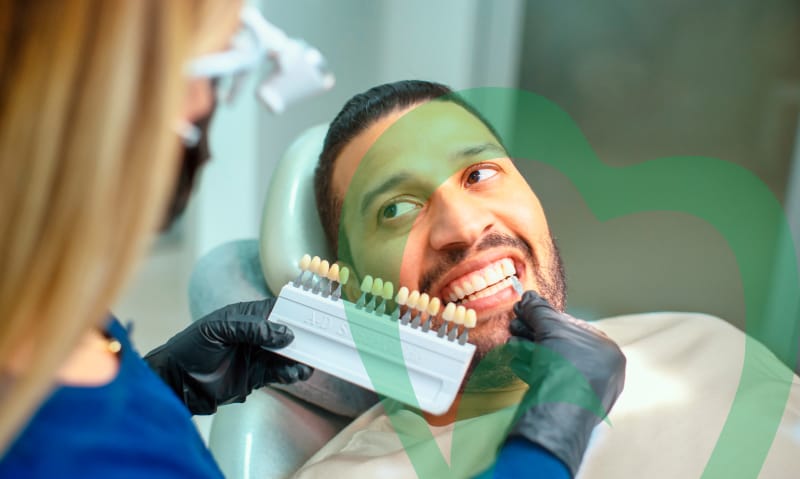Why Do My Teeth Feel Sensitive After Professional Teeth Whitening?

Sensitivity and Whitening: What You Should Know
Are you considering teeth whitening from your Omaha dentist but are concerned about sensitive teeth afterwards? Teeth whitening is a safe and effective cosmetic dental treatment that can leave you with a stunning smile. However, some patients do experience sensitivity after treatment. Here’s what you need to know about sensitivity and teeth whitening.
The Teeth-Whitening Process
There are many whitening options available today. These options rely on bleaching agents in different concentrations and use different systems of application.
The whitening agent lifts surface stains and discoloration to provide a bright, stunning smile, whether you’re relying on whitening strips, trays, or a cosmetic whitening treatment. When you visit your dentist, you can take advantage of higher-concentration whitening agents that deliver faster, more noticeable results.
Dental professionals can administer in-office whitening treatments safely with stronger bleaching agents than you can get over the counter. They’ll apply the whitening agent and then activate it using ultraviolet light. In other cases, professional take-home whitening makes use of custom trays provided by your dentist to get great results at home.
Why You Have Sensitive Teeth After Whitening
The stronger whitening gel used in professional whitening leaves some patients concerned about potential sensitivity. There is some merit to that concern, which your dentist will discuss with you before moving forward.
Enamel is what protects the interior layers, the sensitive dentin and pulp (nerve tissue) at the center. Since whitening agents work by penetrating that enamel to break up stains, it can mildly irritate those inner tissues and allow cold or hot sensations to reach the nerve more easily. Thankfully, this sensitivity after teeth whitening is temporary and fades quickly.
Post-Whitening Dehydration and Nerve Irritation
Another potential cause of sensitivity after teeth whitening is enamel dehydration. Whitening gels absorb moisture from the teeth, which makes it easier for various compounds to reach the inner layers. This is why it’s ideal to avoid consuming any potentially staining food or drinks or using tobacco for a few days after whitening.
The effect of mild enamel dehydration is particularly notable relating to acidic or spicy foods, which can irritate the nerve as well. Dehydration can also cause the whitening agent itself to penetrate farther into the tooth. This is why it’s so important that your dentist provides guidance on the use of higher-concentration whitening agents, whether through in-office treatment or prescribed take-home whitening kits.
Fortunately, these effects usually only last for a few days. Your teeth will quickly return to their natural level of hydration, which will stop outside stimuli from reaching inner layers.
Tips To Manage Tooth Sensitivity
If you have a history of tooth sensitivity, make sure to bring it up with your dentist before moving forward with whitening. They can recommend options that are best suited to your individual needs.
In general, you can help reduce sensitivity by choosing a toothpaste formulated for sensitive teeth. Avoiding foods and drinks known to trigger sensitivity, such as those that are excessively hot, cold, acidic, or sugary, will help manage sensitivity as well.
When brushing, go with a soft-bristled toothbrush and brush gently. The most important aspect to get right when brushing is to brush long enough to ensure full coverage of every tooth. Trying to do it faster by applying more force can wear away enamel and leave your teeth more vulnerable than before.
Lastly, it’s important not to use multiple whitening products at once or exceed the recommended usage. Instead of getting a whiter smile quicker, you could damage your teeth and cause major sensitivity.
When You Should Reach Out to Your Dentist
Mild tooth sensitivity after a professional whitening treatment isn’t anything to be concerned about. However, severe sensitivity that makes it difficult to chew or bite even soft foods can be a cause for concern. The same is true if your sensitivity lasts for more than three days after your teeth-whitening appointment.
Reach out to your dentist if you experience severe or persistent discomfort. While sensitivity after whitening is generally temporary and not a cause for major concern, it is best to let your dentist take a look and rule out other factors.
Professional Teeth Whitening in Omaha
Sensitivity is a normal and temporary side effect of teeth whitening. If you are interested in whitening your teeth, a dentist can guide you on the best approach for your needs and work with you to address any concerns you may have about sensitivity.
You can find the right solution for your unique smile at The Tooth Doc. Our experienced team provides comfortable and effective cosmetic dentistry designed to help you achieve a stunning smile you love to share. Schedule your appointment today.